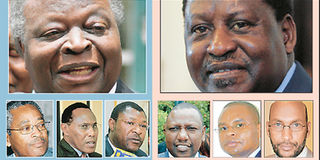Breaking News: At least 10 feared to have drowned in Makueni river
Top team to mediate coalition wrangles

The 12-member team, led by President Kibaki and Prime Minister Raila Odinga, comprises six members from each side of the coalition. Photos/FILE
A top-level 12-member team was on Thursday named to streamline the affairs of the Grand Coalition Government amid fears that it could collapse before 2012.
The committee, which will serve on permanent basis until the end of the Grand Coalition, will be led by President Kibaki and Prime Minister Raila Odinga.
The decision by the President and the PM to appoint the high-powered team drawn from coalition partners — the Party of National Unity and the Orange Democratic Movement — comes against a backdrop of teething problems and differences that have threatened to tear apart the fabric that has held the Government together for the last nine months.
Top level
“President Mwai Kibaki and Prime Minister Raila Odinga have today (on Thursday) appointed a top level permanent committee to handle the management of the affairs of the Grand Coalition,” said a statement from State House last evening.
The team, which comprises six members from each side of the coalition, was named a few hours after Mr Odinga arrived in Nairobi from India and as the country was sagging under the weight of maize and fuel scandals that run into billions of shillings.
Other members of the team are Vice-President Kalonzo Musyoka, Deputy Prime Minister Uhuru Kenyatta; Cabinet ministers George Saitoti, Chirau Ali Mwakwere and Moses Wetang’ula from the PNU side. ODM has on board deputy PM Musalia Mudavadi and Cabinet ministers William Ruto, Mohammed Elmi, Jeffa Kingi and James Orengo.
There is not a single woman in the committee. The committee could be seen as the first step by the Government on the journey to making steady the vessel of the coalition that was last week faced with the severest test when the ODM top organ demanded fresh negotiations over the agreement with PNU.
The ODM National Executive Council (NEC) and its MPs declared publicly that they were no longer going to be subjected to mistreatment by their partners and were ready for any eventuality, including quitting the coalition.
Close ally
“We don’t care any more because PNU are taking us to be junior partners in the coalition,” said an MP who is a close ally of the PM.
The party’s tough statement was triggered by complaints from MPs that President Kibaki was making decisions without consulting Mr Odinga.
They cited the appointment of a transition team at the Electoral Commission of Kenya that was disbanded; the signing of the Kenya Communications (Amendment) Act, and the long delayed appointment of ambassadors which was eventually done on Thursday.
ODM also accused their partners of using the Head of Public Service, Mr Francis Muthaura, to undermine the office of the Prime Minister and demanded that the former should be moved to work under Mr Odinga.
Other complaints touched on the sharing of top jobs in the Government, which ODM argued were supposed to have been distributed equally among the coalition partners.
To solve the problems, ODM demanded formation of a joint committee to arbitrate any differences between the two.
However, the PNU shot back with Cabinet ministers Mutula Kilonzo, Kiraitu Murungi and former MP Nick Salat accusing ODM of failing to sign the coalition agreement that could have established structures required to hold the Government together and provide ways of solving conflicts.
Said Mr Kilonzo, the ODM Kenya secretary-general and Nairobi Metropolitan Development minister: “What ails the coalition is lack of structures that clearly show how the coalition works and solves its disputes. All coalitions everywhere have agreements between coalition partners.”
However, Mr Mudavadi argued that the draft agreement was not well equipped to address the working of a coalition and said that ODM was demanding a comprehensive document.
“The agreement which we saw was not water tight and our side wants a more comprehensive document that can serve the coalition until its sunset in 2012,” he said.
Such an agreement would have provided for a management committee drawn from both sides, a clear manifesto, relationships between the PNU and ODM top organs (NEC), parliamentary group meetings and confidence building mechanisms.
Said Wildlife and Forestry minister Noah Wekesa: “The biggest problem in the Grand Coalition is that of lack of communication between partners, their party organs and MPs. We must be alive to the fact that without communication, a coalition is bound to face problems.”
What has surprised many observers is that while President Kibaki and Mr Odinga seem to have struck a cordial working relationship, their troops have been going for each other’s throats persistently.
The President and the PM normally meet every Wednesday at Harambee House for consultations as stipulated in the National Accord.
It is also significant that although the National Accord has a sunset clause, it lacks a defined escape route should one of the partners resolve to withdraw from the coalition.
The differences between the partners have been taken a notch higher by revelations of a series of corruption scandals ranging from the Sh2.9 billion Grand Regency Hotel sale saga, the Sh825 million maize scandal, the Sh7.6 billion oil scandal and the Kenya Tourism Board debacle that is estimated at Sh43 million.
Kipipiri MP Amos Kimunya was relieved of his duties as Finance minister as the Government sought to unravel the mystery behind the Grand Regency saga.
It now appears that the permanent committee will seek to create harmony in the coalition and pave way for it to fight corruption and tackle wide ranging reforms that include the setting up of a special tribunal to try suspects of post-election violence.




